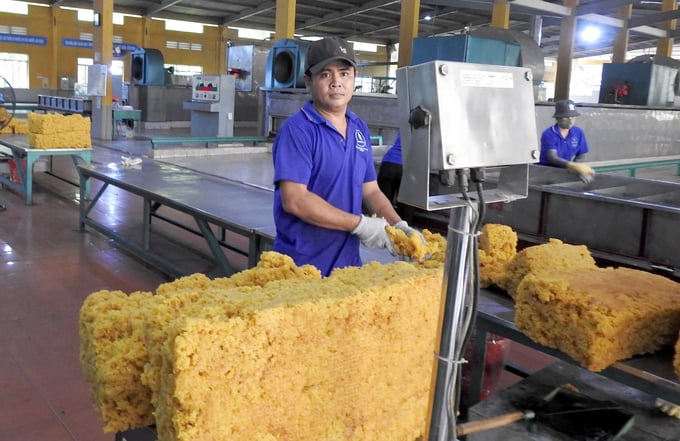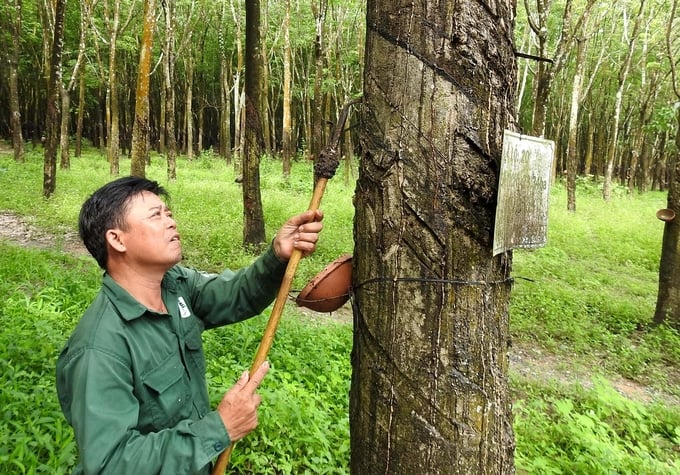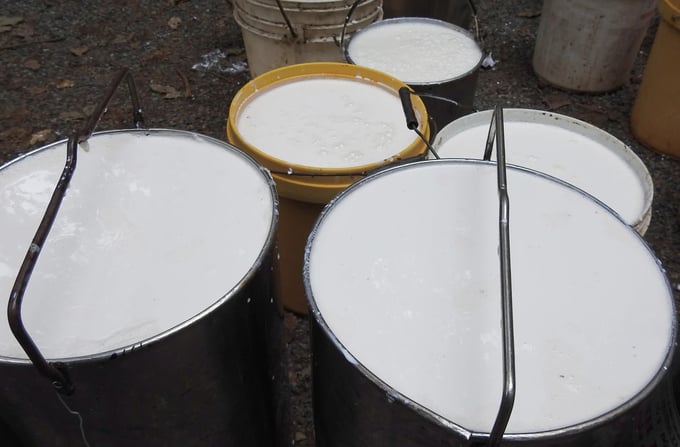May 21, 2025 | 05:29 GMT +7
May 21, 2025 | 05:29 GMT +7
Hotline: 0913.378.918
May 21, 2025 | 05:29 GMT +7
Hotline: 0913.378.918
In the early months of this year, Vietnam's rubber exports declined compared to the same period last year. Specifically, data from the General Department of Customs shows that in the first 5 months of 2024, rubber exports reached 572.28 thousand tons, a decrease of 2.4% in volume compared to the same period in 2023.

Processing rubber latex at Ba Ria Rubber Corporation. Photo: Son Trang.
The decrease in rubber exports is attributed to reduced import demand from some major markets, especially China, the largest importer and consumer of natural rubber in the world. According to China's General Administration of Customs, in the first 4 months of 2024, China imported 2.41 million tons of rubber, a 14.4% decrease in volume compared to the same period in 2023. Due to China's reduced imports, Vietnam's rubber imports into this market decreased by 8.2% to reach 457.51 thousand tons.
An important point to note is that despite the decrease in Vietnam's rubber imports to China, its market share has increased. This is because the reduction in imports from Vietnam was much lower compared to the reduction from Thailand. Information from China's General Administration of Customs shows that in the first 4 months of 2024, Thailand's rubber imports into China decreased by 30.4% compared to the same period in 2023, which is 3.7 times more than the reduction in imports from Vietnam. Therefore, in the first 4 months of this year, while Thailand's market share decreased to 33.7% of the total rubber imports, Vietnam's market share increased to 18.93%.
Despite the decrease in volume, rubber exports increased in value to reach $ 859.4 million in the first 5 months, an increase of 6% compared to the same period in 2023. The increase in export value despite the decrease in volume is due to a significant increase in the average export price of rubber, which reached $ 1,502/ton in the first 5 months of 2024, up 8.6% compared to the same period in 2023.

Rubber latex tapping at Binh Thuan Rubber Joint Stock Company. Photo: Son Trang.
The increase in rubber prices is due to a decrease in global rubber production. According to estimates from WhatNext Rubber Media, compared to Q1/2023, in the first quarter of this year, rubber production in Vietnam decreased by 2.7%, Thailand by 18.3%, and Indonesia by 15.2%.
Thailand, Indonesia, and Vietnam together account for nearly 60% of the world's natural rubber production. Therefore, the reduction in rubber production in these countries has led to an 8.5% decrease in global production in the first quarter of this year compared to the same period last year. WhatNext Rubber Media also estimates that global rubber production has decreased by 5% in the first 4 months of this year compared to the same period last year.
The increase in rubber prices has boosted the revenue of many rubber companies in the early months of this year. Mr Tran Cong Kha, Chairman of the Board of Directors of Vietnam Rubber Group (VRG), stated that in the first 5 months of the year, the average selling price of rubber for the Group reached VND 38.4 million/ton, an increase of more than 6 million VND per ton compared to the same period in 2023. Over the past 5 months, VRG has sold 150 thousand tons of rubber, achieving 29% of the Group's annual plan. Since rubber is the main revenue contributor for VRG, the increase in rubber prices has significantly contributed to the Group's revenue of over VND 7,100 billion in the first 5 months of the year.
Despite China's reduced rubber imports, it remains the largest market for Vietnamese rubber. In the first 5 months of 2024, rubber exports to this market reached 380 thousand tons, worth $ 547 million, a decrease of 14.2% in volume and 8.8% in value compared to the same period in 2023. Due to the decrease in imports from Vietnam, China's market share in Vietnamese rubber exports has also decreased significantly, from 75.65% of the volume in the first 5 months of 2023 to 66.47% in the first 5 months of 2024.

Newly tapped rubber latex. Photo: Son Trang.
While rubber exports to China have declined, exports to many other markets have increased. Among them, there are markets that have seen significant growth in volume such as Sri Lanka with a 436% increase, Indonesia with 83%, Brazil with 60%, Italy with 55%, and India with 43%... Although the volume of rubber exported to these markets is still relatively modest compared to the Chinese market, ranging from several thousand to tens of thousand tons per market in the first 5 months of the year, the strong growth of these markets has contributed to maintaining Vietnam's rubber exports despite the slight decrease in volume over the past 5 months.
Translated by Hoang Duy

(VAN) Oliyar, a prominent Ukrainian oil and fat manufacturer, has revealed plans to build a farm for 2.3 million laying hens in the Lviv region. The additional production quantities promise to change the competitive landscape of the egg market of the Eastern Europe region.

(VAN) On May 15, Ministry of Agriculture and Environment of Vietnam hosted the 'Connecting Vietnam - Germany agricultural, forestry and fishery trade' seminar in Berlin, Germany.

(VAN) In the face of counterfeit and imitation products, Khanh Hoa Salanganes Nest Company hopes for the prompt completion of the legal framework, strict enforcement against violations, and protection of the bird’s nest brand.

(VAN) Japan's efforts to lower the price of rice through the release of its stockpile may finally be making some progress, albeit at a snail's pace.

(VAN) U.S. tariffs are not only a 'shock', but also an opportunity for Vietnamese businesses to renew their mindset toward comprehensive development.

(VAN) As Bac Giang lychee enters the harvest season, Minister Do Duc Duy expects that the fruit will contribute greatly to agricultural exports due to standardized production and deep processing.

(VAN) Consumers have shown a preference for free-range eggs, but those farming systems are more vulnerable to biosecurity risks like bird flu.